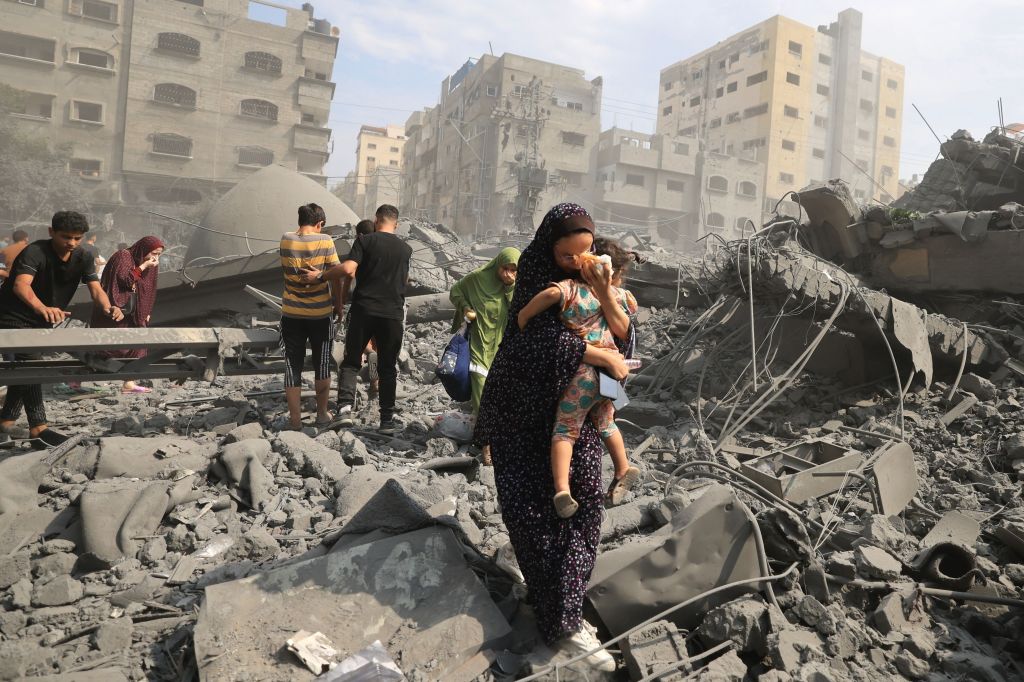By Joseph Ekeng
In a shocking turn of events, the Israeli-Hamas conflict, which erupted on October 8, 2023, has sent shockwaves around the world. The situation is rapidly evolving, and its implications are far-reaching, with potential consequences for countries far from the epicenter of the conflict, including Nigeria.
The conflict began with an unexpected attack by the Palestinian militia group, Hamas, on Israel, resulting in the abduction of over a hundred individuals and the tragic loss of more than 1200 Israeli lives. Over 2700 people were injured on the Israeli side, making this the deadliest attack in a long-standing conflict dating back decades.
Israel responded swiftly, resulting in the loss of over 1200 Palestinian lives, a figure that is expected to rise in the days to come. The international community’s response has been mixed, with the United States and most Western nations labeling Hamas as a terrorist organization, while Iran and other supporters of the Palestinian cause point to Israel’s territorial expansion and occupation as the root causes of the conflict.
Nigeria, a country already grappling with significant economic challenges, faces potential economic repercussions due to the conflict. Here, we delve deeper into the key areas of concern:
Oil Prices: Nigeria is a major oil-producing country, and the Middle East, despite not being a direct source of Nigeria’s oil, is a significant hub for global oil production and trade. It contributes around 33% of global crude oil production. Any instability in the region, like the Israel-Gaza conflict, can lead to speculative price hikes due to potential supply disruptions. Historically, Middle Eastern crises have often led to spikes in oil prices, affecting global inflation rates and trade balances.
Should the conflict escalate, it could disrupt shipping routes or involve other oil-producing nations in the region, especially Iran, which could severely impact global oil prices. While an upward trend in oil prices could benefit Nigeria by increasing its oil revenue, it could also affect production costs across industries and increase energy costs for businesses and households, especially for countries dependent on refined petroleum imports like Nigeria. Diesel prices are currently above N1,000/Liter, and they are likely to keep rising if crude oil prices continue to increase.
Interest Rates: Nigeria is already grappling with skyrocketing interest rates, with August figures hitting an 18-year high of 25.8%. The August inflation figure rose for an eighth straight month from July’s 24.08%, according to the National Bureau of Statistics (NBS), compounding a cost of living crisis worsened by recent reforms. A protracted conflict could exacerbate these issues, further burdening businesses and households, making it harder to access credit or invest in the struggling economy.
Exchange Rate: Nigeria’s foreign exchange reserves are closely linked to its oil revenues. Therefore, any significant fluctuation in oil prices could lead to uncertainty in foreign exchange reserves. A decrease in these reserves can result in the depreciation of the local currency, the Nigerian naira, against major currencies like the US dollar. As a result, this depreciation can impact businesses’ ability to import goods, causing potential disruptions in the supply chain.
Trade Relations: Nigeria, like many countries, maintains trade relations with Israel. While their trade volume isn’t massive, any prolonged conflict could disrupt trade ties or the ease of doing business between the two nations.
Companies that rely on imports or exports between Israel and Nigeria may experience delays, added costs, or reduced business. Israel’s Ambassador to Nigeria, Michael Freeman, reported that bilateral trade relations between both countries stand at about $200 million to $250 million annually, primarily in the areas of security, technology, and construction. This war may likely affect businesses in these sectors that rely on trade partnerships, potentially lowering the trade volume.
Global Economic Sentiment: The Israeli-Hamas conflict, especially if prolonged or escalated, can significantly affect global economic sentiment, investor confidence, and risk perceptions. Such conflicts create uncertainties in global markets, which could impact Nigeria, being part of the global economy.
Nigeria is currently experiencing one of its worst cycles of low foreign investment inflow and badly needs forex inflows to stabilize its exchange rate. But with the conflict likely to escalate, some countries such as the US, Saudi Arabia, India, and the EU Bloc, which Nigeria has been wooing for foreign investors, might not prioritize investments in Nigeria as they deal with the conflict’s repercussions in the Middle East. Reduced capital importation can put pressure on the naira, leading to potential depreciation.
Diaspora and Remittances: While the Nigerian diaspora in Israel is not as large as in some other countries, there are still Nigerians living, working, and studying in Israel. A prolonged conflict could affect their safety and ability to work or send remittances back to Nigeria. Remittances from the diaspora play a vital role in Nigeria’s economy, particularly for households dependent on these funds. Reduced remittances, even if minor, can have a substantial impact on the Nigerian economy.
Terrorism and Security Concerns: The Israeli-Hamas conflict could embolden or inspire extremist groups in Africa, including Nigeria. Groups such as Boko Haram or other regional extremist factions might find motivation in the conflict for their own purposes. This could lead to an escalation in regional tensions or violence, which can have direct economic costs in terms of security provisioning, displacement of people, and disruption of economic activities, especially in Northern Nigeria and the middle belt.
The last thing the current government needs is an escalation of insecurity from religious extremists who might see this war as motivation to increase attacks locally. This will be a huge distraction for the government, which already has limited resources to embark on a protracted security crisis.
Hospitality and Tourism: In light of conflicts, many countries issue travel advisories to their citizens, cautioning them against non-essential travel to affected areas. Nigeria may issue advisories discouraging travel to Israel and the surrounding regions in the Middle East, impacting business, tourism, and personal travel.
Similarly, other countries, based on their assessment of the situation and possible retaliations, might issue advisories against traveling to Nigeria or other nations perceived to be at risk.
This could have a significant effect on the revenue of the domestic hospitality industry in Nigeria and impact growth in the tourism sector.
As the world watches the unfolding crisis in the Middle East, the economic stability and future of Nigeria hang in the balance. The ramifications of this conflict reach far beyond the borders of Israel and Gaza, serving as a stark reminder of the interconnectedness of our global economy and security. While it’s impossible to predict the outcome of the Israeli-Hamas conflict and its full impact on Nigeria, it is clear that the consequences could be profound and far-reaching, potentially shaping the nation’s economic landscape in the years to come. As Nigeria navigates its complex economic challenges, the international community must closely monitor this situation and seek ways to support stability and prosperity in the region.






Comment
No comments found.